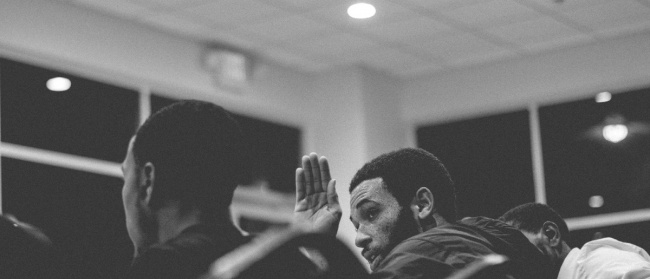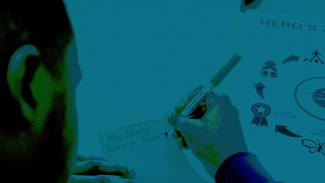InconversationwithSparkInsideCoach,JeffreyWotherspoon
This week, we caught up with one of our Head Coaches, Jeffrey, for a powerful conversation about his experience as a Spark Inside coach. Jeffrey joined our team in 2013, and has been facilitating our award winning intervention, Hero’s Journey™ – a structured life coaching programme for young people aged 15 to 25 – in prisons across London and the South East.
Our Hero’s Journey™ programme builds young people’s motivation to change, as our coaches guide them on their journey to a more productive, fulfilling and crime-free future.
Let’s start with the basics! Why did you choose to start coaching young people in prison?
I see myself as someone who could’ve easily been in custody. Growing up, crime was all around me, so it was more of a norm than anything else. I had the mind-set that I’d been dealt particular cards in life, and for that reason I needed to do the best with what I had. 90% of the people I interacted with had the same mind-set. You end up doing bad things, you know, you end up selling drugs, you get into debt problems, or violence – you’re not an inherently bad person, and you don’t want to do bad things, but these are just the things that come. Those ways aren’t seen as bad, or deemed criminal. If I didn’t sell drugs someone else would, so why would I sit down and let someone else make money, when I have the ability to? Crime seemed like my only way to make it and have the lifestyle that I want, and I wasn’t looking to be a millionaire.
When I went to university, I had particular experiences there that opened my eyes. The way that I saw the world wasn’t the way it actually was, and I realised there were opportunities out there for me.
“I saw myself, for the first time, with a choice: I am now able to choose what I do in life.”
My heart led me on a path to helping those who were just like me. I set out to support others who grew up in a similar environment to make different decisions and have positive choices in life. When I started out on that journey, I always knew that there was a more powerful tool.
Then I experienced coaching myself for the first time. While I was being coached, I was so surprised at the answers that I had written down on paper and some of those things that were inside of me. There was no way for me to know that those things were inside of me, if they hadn’t been asked of me by my coach. That experience was life changing for me, because the next thing I said was: I want to be a coach, and use these skills that I have just experienced to help others.
What is the most challenging part of being a Spark Inside coach?
When I’m not working with young people in prison, there’s nothing challenging about being a coach. In prison, the most challenging part is being detached from the outcome. Sometimes I’m asking the questions and it seems as though young people are not allowing their minds to be stretched to particular places, and I can see the answer just there. If they come to it themselves, there is a lot of power – it becomes what they think and what they see. If I just slotted it in there for them, it would just be ‘I remember what Jeffrey said’.
Coaching professional clients, they know what to expect and come prepared with a topic. Sometimes, the young person will just know that they want to make a change, but they will have no idea what that change is, or what they want to be coached on. In coaching, you need to start from somewhere. Many of these young people don’t know what they’re good at. No-one has ever asked them ‘what are your strengths?’ before. This is why the Hero’s Journey workshop is powerful, because references are made to strengths, values and beliefs so they become more aware of themselves – and even if they don’t, I have an idea because I facilitated the workshop. So I can say look what happened here, and we can start to move forward from there.
If being detached is the most challenging part, what is the best part about coaching young people?
The insights and the realisations. I remember talking with a young person about his upcoming release. This guy held a negative belief that he was stupid, which was challenged almost immediately just through questioning. He said, ‘wait! I’m not stupid am I?’ You could see his mind ticking over. He started thinking about all the times he had achieved something, and he realised that the thought of him being stupid had prevented him from doing so many things. I asked him, what can you do now that you know you’re not stupid? He looked around, saying I can do anything, and he started to believe it himself. I had goose bumps all over my body, I felt like I had won the lottery, because as a coach, that is what you want; you want young people to understand themselves in positive ways, and for it to change their whole paradigm.
When I was working with him that day, I could see everything change for him. He was telling me about the times when he was the best at something, and he hadn’t realised. Now he is learning about himself and seeing things for what they really are, not what he’d perceived them to be.
Do you usually see powerful things like that happen in one coaching session?
A high majority of sessions are exciting. I get goose bumps regularly, there is nothing like that you know. When you see some things really happening, the energy picks up and the atmosphere changes. You can’t really engineer that to happen, so when it does happen organically you can feel the transformation. I was coaching a guy in HMP Isis this morning, and our session was amazing. The sessions have been so powerful that every time I’m going to see him, he picks my energy up. You just know that there is so much potential there.
A young person I coached in Medway STC, each and every coaching session we had was special. I had goose bumps in every one of them, there were tears in them – you can’t make it up. With some young people you can see and feel that coaching is really shifting things for them.
Do you think coaching is the most effective approach to shift young people’s perspective?
“At the moment, I don’t know of a more effective approach than coaching, and if I did I would probably be using it.”
Not only shifting young people’s perspective, but empowerment, enablement, belief, motivation… I don’t know what else there is apart from coaching.
People in prison tend to only listen to themselves. They won’t necessarily listen to their parents, or authority figures. Coaching is a tool that facilitates listening to yourself. The only difference is now, they’re listening to themselves telling themselves to do positive things, as opposed to negative things and that’s what they’re going to listen to, now they know and believe it in their heart. When they’re telling themselves, this is what I can do and this is what I want to do, they’re more likely to follow through.
You can’t say I’m going to tell these people what to do as if they don’t know. No-one has sold drugs who thought it was the right thing to do, but they’re choosing to do it. It is not so much about showing them the consequences. I don’t think there is a person who sells drugs, carries a knife, joins a gang, who thinks they can’t go to prison for this, but the consequences don’t outweigh the perceived benefits. Coaching allows them to bring their own benefits and consequences, and really evaluate it in that way. We bring it to the point for them where it is not worth it anymore. For most people, they’re stuck in their ways, and it is those people that coaching is most beneficial for; the people who want to change, but don’t know how. Coaching is an amazing process. The person needs to understand it and want it, and then it can change their world.
“Coaching is effective because for the first time, we show young people where they are in their life and where they could be: they gain perspective of where they are on their own journey of change.”
What advice would you give to coaches who are starting to think about working with young people in prison?
Spark Inside enables young people to see their own life from an objective point of view. The workshop allows young people to see the futures that are possible for them, and then through specific coaching exercises, it allows them to experience what it would be like to have those futures. After the workshops, the one-to-one coaching gives them the support they need to get them to the futures that they want to get to.
Being a Spark Inside coach feels amazing. It makes me happy that I’m able to facilitate such a process.
What do you think appeals to young people about our programme?
It is very centered on their own lives, but it makes them think about it in ways which they haven’t before. It makes them see the possibilities for their own life. They do what they do because of how they see themselves and their future. A young person can join a gang because they want to be the biggest gangster, so everyone knows and respects them, they have a sense of power and achievement. The workshop allows them to have all of those things but in a positive way. They don’t run the risk of being in prison or losing their life. They come up with where they end up, they see it as a possibility, and they’re excited by it. They get to decide and see for the first time what they can have in their own lives. Their perspective completely shifts.


